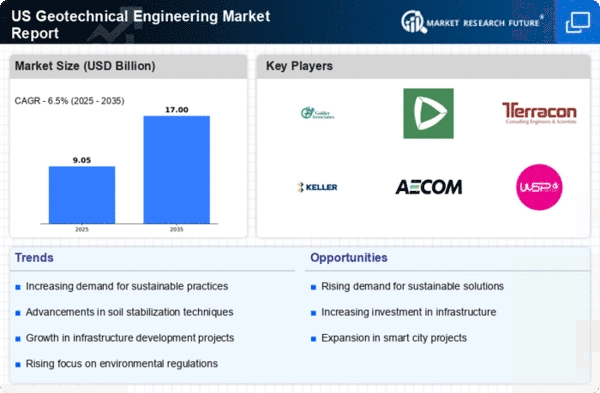Urbanization and Population Growth
Urbanization and population growth in the United States are significantly influencing the geotechnical engineering market. As more individuals migrate to urban areas, the demand for housing, commercial spaces, and public facilities increases. This trend necessitates the evaluation of soil conditions and site stability, which are critical components of geotechnical engineering. According to the U.S. Census Bureau, urban areas are projected to house over 80% of the population by 2050, leading to a heightened need for geotechnical services. Consequently, the geotechnical engineering market is poised to expand as engineers work to ensure that new developments are safe, sustainable, and resilient against natural hazards.
Infrastructure Development Initiatives
The ongoing infrastructure development initiatives in the United States are a primary driver for the geotechnical engineering market. With the federal government allocating substantial funding for infrastructure projects, including roads, bridges, and public transportation systems, the demand for geotechnical engineering services is expected to rise. For instance, the Infrastructure Investment and Jobs Act has earmarked approximately $1.2 trillion for various infrastructure improvements, which will likely necessitate extensive geotechnical assessments and soil investigations. This surge in infrastructure projects not only enhances the need for geotechnical engineering expertise but also stimulates job creation within the sector, thereby contributing to the overall growth of the market.
Investment in Renewable Energy Projects
The growing investment in renewable energy projects is emerging as a significant driver for the geotechnical engineering market. As the United States transitions towards sustainable energy sources, the development of wind farms, solar energy installations, and other renewable projects requires comprehensive geotechnical evaluations. These assessments are crucial for determining site suitability, soil stability, and potential environmental impacts. According to the U.S. Energy Information Administration, renewable energy sources are expected to account for a larger share of the energy mix in the coming years, thereby increasing the demand for geotechnical engineering services to support these initiatives.
Environmental Regulations and Compliance
The increasing emphasis on environmental regulations and compliance is a notable driver for the geotechnical engineering market. Regulatory bodies in the United States are implementing stricter guidelines to mitigate environmental impacts associated with construction and land development. This trend compels companies to engage geotechnical engineers to conduct thorough environmental assessments and ensure compliance with regulations such as the Clean Water Act and the National Environmental Policy Act. As a result, the demand for geotechnical engineering services is likely to grow, as firms seek to navigate complex regulatory landscapes while minimizing their ecological footprint.
Technological Advancements in Geotechnical Practices
Technological advancements in geotechnical practices are reshaping the landscape of the geotechnical engineering market. Innovations such as advanced geophysical testing methods, 3D modeling, and data analytics are enhancing the accuracy and efficiency of geotechnical investigations. These technologies enable engineers to better assess subsurface conditions, leading to improved project outcomes and reduced costs. The integration of technology into geotechnical engineering practices is expected to drive market growth, as firms increasingly adopt these tools to remain competitive. Furthermore, the potential for automation and artificial intelligence in geotechnical assessments may further streamline processes and enhance decision-making capabilities.
















